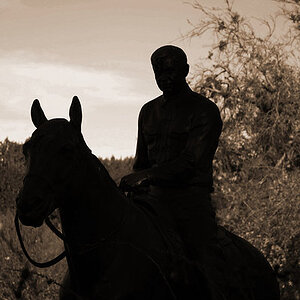ebc123
TPF Noob!
I have a pretty good idea about legal issues regarding photographing people (a real quagmire in itself) but I am confused about photographing landscapes, nature, etc.
My intention is to eventually use some of the photos for commercial gain. At least I'd like to have the possibility of it.
I figure about 95% of what I want to photograph in this regard I cannot do from a public road, etc. I figure maybe 2% of that 95% I could reasonable get permission to shoot. For instance, try approaching some property owner you don't know. Most of them don't want to open the door, let alone give you permission to shoot. Also half the time it's extremely difficult or for all practical purposes impossible to know who the owner is.
If it's a public park or any public property, you can probably forget that too. They almost all prohibit commercial gain photography. Even if obtaining permission was a practical route (although I'm sure it's a lot like asking the property owner as described above,) this takes board and supervisor meetings, etc. before you'd get approval. Who has that kind of time and effort?
So am I to believe all these photographs published in books, sold as stock photography, etc are from photographer's obtaining permission for the property owners or park commissions? This seems VERY difficult to believe. Can anyone cue me in what goes on in this reagard? Thank you for any information.
My intention is to eventually use some of the photos for commercial gain. At least I'd like to have the possibility of it.
I figure about 95% of what I want to photograph in this regard I cannot do from a public road, etc. I figure maybe 2% of that 95% I could reasonable get permission to shoot. For instance, try approaching some property owner you don't know. Most of them don't want to open the door, let alone give you permission to shoot. Also half the time it's extremely difficult or for all practical purposes impossible to know who the owner is.
If it's a public park or any public property, you can probably forget that too. They almost all prohibit commercial gain photography. Even if obtaining permission was a practical route (although I'm sure it's a lot like asking the property owner as described above,) this takes board and supervisor meetings, etc. before you'd get approval. Who has that kind of time and effort?
So am I to believe all these photographs published in books, sold as stock photography, etc are from photographer's obtaining permission for the property owners or park commissions? This seems VERY difficult to believe. Can anyone cue me in what goes on in this reagard? Thank you for any information.













